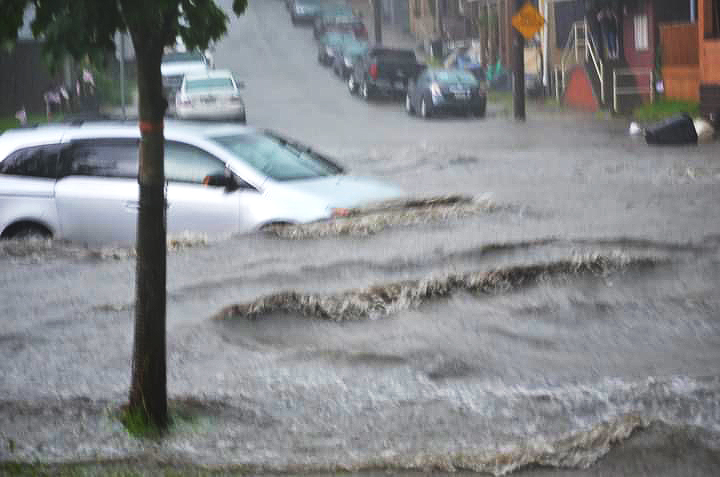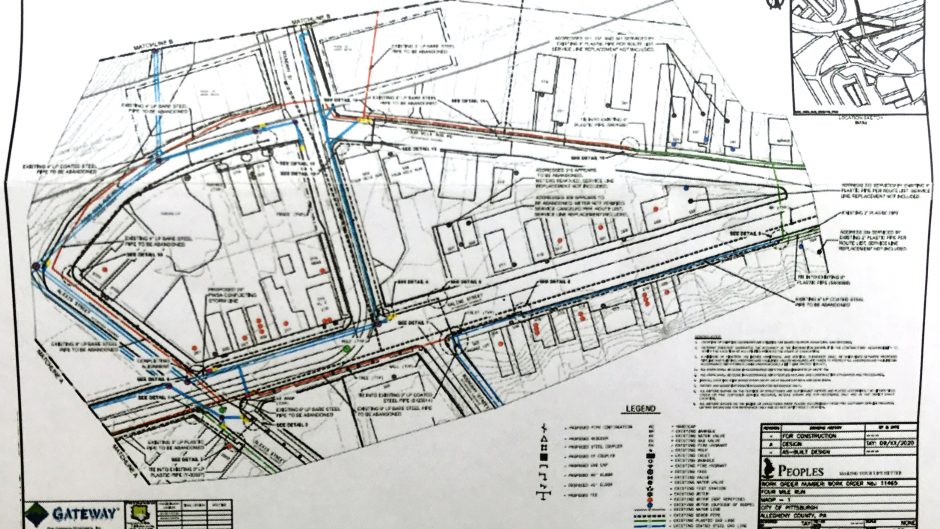Despite receiving a Technical Deficiency Letter from the Pennsylvania Department of Environmental Protection (PA DEP) in response to their dual permit application for the problematic Mon-Oakland Connector (MOC) shuttle road and Four Mile Run Stormwater Project, PWSA shows no sign of reconsidering its plans. The current stormwater project is inadequate to address the flooding issues, in part because it was designed around the MOC. On top of that, existing flood protection benchmarks do not account for worsening conditions caused by overdevelopment and climate change.
May 27: The PA DEP sent the Technical Deficiency Letter. Its engineering and environmental comments contained numerous references to the MOC and requests for clarification on its impacts. Here is a small sampling of problems from the 8-page letter.
Engineering comment 5d: Was the area as a result of the Department of Mobility and Infrastructure proposed trail and road incorporated into the flood analysis inundation limits study for proposed conditions. Provide evidence that the impervious area will not contribute additional flow increasing water surface elevations detailed in Figure 01 & Figure 02 of Project 2018-GI-102-0.
Environmental comment 25: Per Module S1, in the EA, “The purpose of the Project is to manageand/or remove direct stream inflow to the existing CSS within the Junction Hollow valley of Schenley Park and to improve the CSS system from Junction Hollow to the Monongahela River, by repair, replacement, and/or separation of the CSS and stormwater lines. The goals and benefits of the Project are to reduce CSOs; reduce flood risks and basement backups; reduce sediment transport; and leverage resources for regional benefit, including align with the Parks Master Plan.” Describe the relationship between PWSA’s project and the City of Pittsburgh’s project, in terms of the project purpose.
Environmental comment 26: The Pittsburgh Water and Sewer Authority (PWSA) is identified as the applicant, on the application form; however, the Project Description identifies the Mon-Oakland Mobility Project as a City of Pittsburgh project, led by the City’s Dept. of Mobility and Infrastructure (DOMI). Since PWSA is the applicant, will PWSA be responsible for the operation and maintenance of this section of DOMI’s project? Alternately, please consult with DEP, regarding additional permit requirements, if PWSA will not own or have primary responsibility for this section of DOMI’s Mon-Oakland Mobility Project.
Environmental comment 29: Since this application only includes a section of DOMI’s Mon-Oakland Mobility Project, identify and describe, to the extent possible, any and all potential impacts to aquatic resources, including watercourses, floodways, floodplains and bodies of water, from the overall Mon-Oakland Mobility Project. Please note that based on your response to this item, that a Comprehensive Environmental Assessment may be requested.
The letter stated that PWSA had 60 days to respond to these comments, or the application would be considered withdrawn. The deadline was July 27.
May 28: At the monthly PWSA board meeting Ziggy Edwards of The Run urged the PWSA to create a model for the stormwater project that does not include the MOC. She also asked for a report PWSA commissioned from ms Consultants that provides great detail on the Four Mile Run watershed and was funded with ratepayer dollars.
June 3: PWSA chief of project management Alex Sciulli denied Ms. Edwards’ request for the report. Regarding the dual permit application, Mr. Sciulli said he “asked staff to prepare a response to the PA DEP letter and to provide additional clarification regarding the stormwater impact of the proposed MOC, including the specifics of the ms Consultants report and previous modeling.” He added, “At the appropriate time, we will be happy to share and discuss our response to your inquiries.”
Mr. Sciulli did not clarify how PWSA would be able to address in two months the fundamental shortcomings identified by PA DEP.
June 13: Intense storms caused flash flooding in The Run that totaled several cars, damaged a garage, and caused sewage backups in basements.

June 25: At the monthly PWSA board meeting, several Run residents spoke and/or submitted statements regarding the June 13 flood. Ms. Edwards again implored the PWSA to come up with a plan to address flooding that is not designed around and hindered by the MOC.
“We need answers on how much better PWSA could address the combined sewer overflows without [the road]. These answers have life-or-death importance to The Run,” she said.
Ray Gerard of lower Greenfield recounted the flood’s aftermath in his statement. “The City again neglected to show up and remove inches of leftover fecal matter on the streets, sidewalks and limited community green space. The neighborhood literally smelled like [$#!*] for days. It’s understood that there are other areas of the city that suffered damage and flooding, but that was runoff storm-water, not raw sewage… Residents and their children are forced to breathe this toxic air in for days. Our local officials continue to ignore, at great risk, the lives and health of Run residents.”
July 9: PWSA senior group manager Tony Igwe sent a letter to Run residents informing them that although “the plans for the stormwater project are being reviewed by the [PA DEP] and we cannot move forward with construction [on the stormwater project] until a permit is issued … People’s Natural Gas (PNG) will begin construction to replace existing gas lines along Saline Street, Alexis Street, Four Mile Run Road, and Boundary Street.” The letter included a tiny image of a map with illegible text (see image above).
Stay tuned for updates on PWSA’s response to the Technical Deficiency Letter and whether PNG’s planned construction lacks necessary permits.

Recent Comments